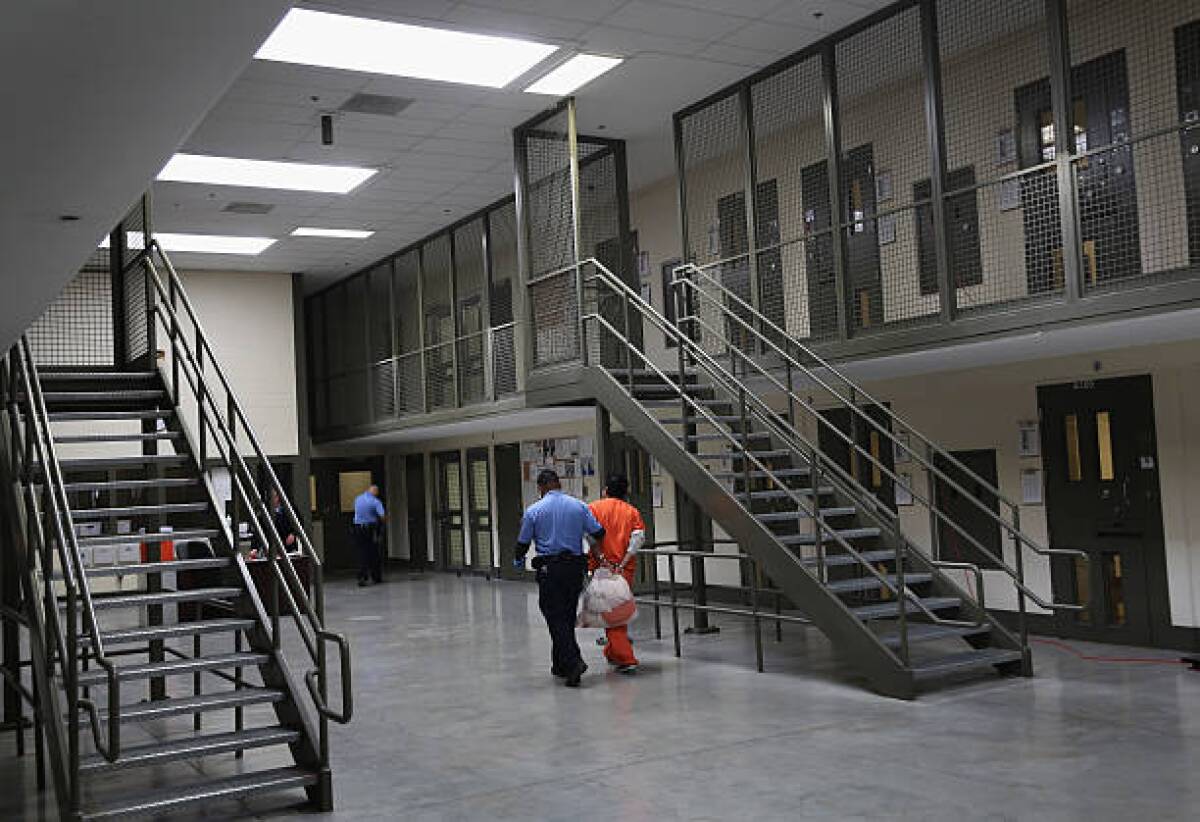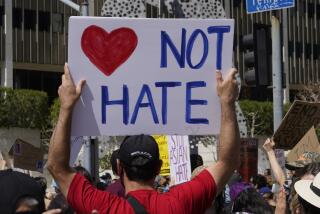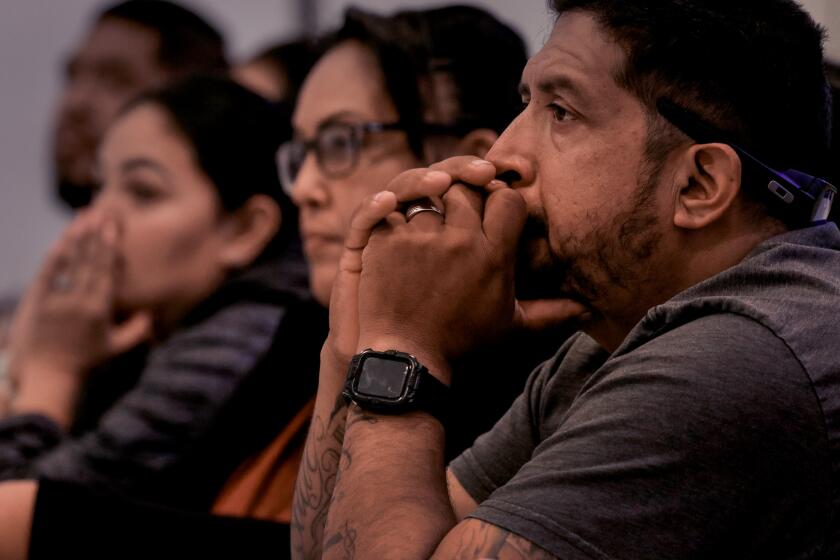Abuse reports from detained Black immigrants disproportionately high, advocacy groups say

WASHINGTON — After analyzing the records of nearly 17,000 calls between 2016 and 2021 from its national immigrant detention hotline, Freedom for Immigrants released a report Wednesday that it and other advocacy groups say indicates a pattern of racism and abuse toward Black migrants.
Among the findings of the report, the groups concluded that 28% of 2,200 abuse-related reports came from detainees from predominantly Black countries, despite accounting for 6% of the detained population in 2019, according to their analysis of the most recent population data by country of origin from the Transactional Records Access Clearinghouse, a nonpartisan data research organization at Syracuse University. Freedom for Immigrants and the other groups behind the report, including the Black LGBTQIA+ Migrant Project, the Black Alliance for Just Immigration and the UndocuBlack Network, advocate for the abolition of immigrant detention.
According to the study’s methodology, the analysis assumes that detainees calling from Black-majority countries are Black. The authors filtered call records for phrases indicating verbal or physical abuse, such as “medical neglect,” “assault,” and “N Word.”
Alexxis Pons Abascal, a spokesman for U.S. Immigration and Customs Enforcement, said in a statement to The Times that the agency is committed to ensuring that everyone in custody is safe and under the appropriate conditions of confinement. He said ICE encourages people to report allegations of misconduct.
“Personnel are held to the highest standards of professional and ethical behavior, and when a complaint is received, it is investigated thoroughly to determine veracity and ensure comprehensive standards, which ICE is required to follow, are strictly maintained, and enforced,” Pons Abascal wrote.
Black migrants are placed in solitary confinement at higher rates than non-Black migrants, according to the Black Alliance for Just Immigration. In some facilities in the South, including Etowah County Jail in Alabama, Stewart Detention Center in Georgia and Richwood Correctional Center in Louisiana, Black people were almost twice as likely to report experiencing abuse compared with detainees of other races, the groups’ report notes.
In May, Marlissa Joseph, a 22-year-old detainee at the Baker County Detention Center in Florida, said she was in line for the commissary when a guard used a racial slur and lunged at her.
Joseph, who was born in the Bahamas and is Black, told The Times she had complained weeks before the incident to other facility staffers about the guard’s treatment of detainees. Joseph said word got back to the guard, who confronted her in the commissary line. She said the guard attempted to run toward her but was held back by other staffers.
Joseph said her requests to press charges were dismissed. She was transferred to Immigration and Customs Enforcement custody in July 2021 after completing a jail sentence for robbery with a firearm and is appealing her deportation order. She said she worries for her safety if she is released.
“It’s really mentally abusing,” she said. “I’m not used to having people scream at me. When you complain they say, ‘If you don’t like it, go back to your country.’ ”
The Baker County Sheriff’s Office did not respond to a request for comment from The Times.
Report authors said that the true share of hotline calls from Black migrants is probably undercounted and that more data on the treatment of Black people in detention is needed. Freedom for Immigrants didn’t begin gathering racial demographics from hotline callers until last year, and ICE records only detainees’ country of origin.
Pons Abascal, the ICE spokesman, didn’t respond to a question about why the agency doesn’t gather racial demographics.
“We must stop treating Black migrants’ cries for redress and accountability as isolated incidents, and instead recognize them as being indicative of the systemic harm taking place,” the report states. By not collecting race and ethnicity data, as is standard among other government and law enforcement agencies, the Department of Homeland Security “is able to obscure the anti-Black violence and abuse perpetrated against immigrants.”
Freedom for Immigrants’ national hotline receives an average of 250 calls per week. Staffers review the calls twice a week and select the most significant cases of abuse for intervention by advocates and lawyers. Over the course of two years ending in August, half the cases that the organization submitted complaints for were on behalf of Black detainees.
In 2019, ICE shut down the hotline shortly after it was featured on the show “Orange Is the New Black.” Freedom for Immigrants sued, arguing the termination was an act of retaliation and a violation of free speech. Months later a judge ordered the federal government to restore the hotline.
Immigration and Customs Enforcement shut down a real hotline for detained immigrants run by the California group Freedom for Immigrants less than two weeks after it was prominently featured on the show.
Toll-free numbers for pro bono attorneys and organizations must be approved as extensions issued by the phone service provider for detention facilities because such numbers aren’t accessible to detainees inside the facilities. Detainees can also report complaints to an internal DHS helpline, or to the Office of Inspector General, but 911 is inaccessible and they must pay for calls to other numbers.
Unlike criminal inmates, immigrant detainees are not entitled to free legal counsel or phone calls.
Advocates have spoken out about injustices against Black migrants for years. Last year, images from the border in Del Rio, Texas, showed Haitian migrants being chased by Border Patrol officers on horseback carrying whips. The year before, Cameroonians detained in Louisiana and Mississippi said they were threatened, beaten and forced into signing deportation documents.
In 2021, Black detainees filed a civil rights complaint about sexual assault, retaliation and other abusive conditions at Krome North Service Processing Center in Miami. Medically vulnerable detainees at Stewart Detention Center in Georgia also filed a civil rights complaint last year.
Haddy Gassama, policy and advocacy director with the UndocuBlack Network, which is among the Black-led immigrant rights groups that worked on the report, said it’s important to recognize the historical context and connections between mass incarceration and immigration detention.
“It makes sense that Black migrants feel the heaviest brunt of the immigration detention system in a similar way that African American people in this country disproportionately feel the heaviest brunt of its criminal justice system,” she said. “Black migrants are facing this double punishment of sorts.”
More to Read
Get the L.A. Times Politics newsletter
Deeply reported insights into legislation, politics and policy from Sacramento, Washington and beyond. In your inbox three times per week.
You may occasionally receive promotional content from the Los Angeles Times.











